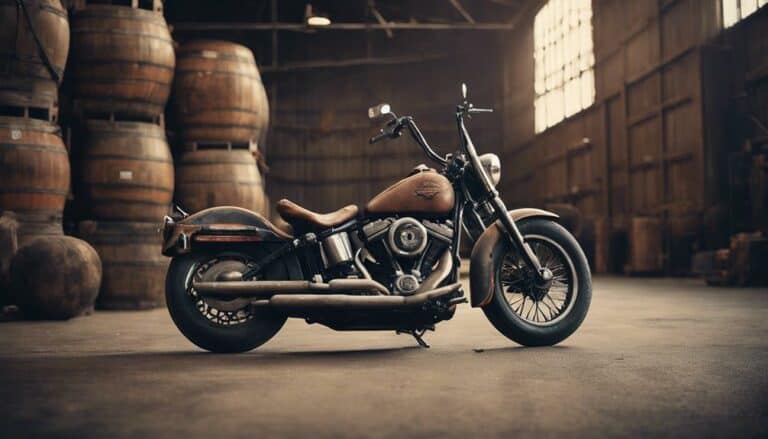Digging into the depths of Harley-Davidson's business model, you'll find a company that goes beyond just motorcycles. With a legacy spanning over a century, Harley-Davidson has carved a unique niche in the market.
But what sets them apart from traditional motorcycle manufacturers? Stay tuned to uncover the intricate layers of Harley-Davidson's diversified operations and strategic initiatives that keep enthusiasts and investors alike intrigued.
Key Takeaways
- Harley-Davidson is a renowned American motorcycle manufacturer with a global dealer network.
- The company specializes in designing, assembling, and marketing motorcycles, including innovative electric models.
- It balances tradition and innovation, dominating the heavyweight cruiser market and leading in electric motorcycles.
- Harley-Davidson's brand identity emphasizes adventure, freedom, and a strong sense of belonging in motorcycle culture.
Overview of Harley-Davidson Business
Harley-Davidson Inc, a renowned American motorcycle manufacturer, excels in crafting premium motorcycles and related products. The company's expertise lies in designing, assembling, and marketing motorcycles, including those equipped with the iconic V-Twin engine. Harley-Davidson's headquarters in Milwaukee serves as the hub for its operations, overseeing a vast dealer network that distributes its products worldwide. The company's just-in-time inventory system ensures efficiency in production and delivery, enabling it to meet customer demands promptly.
In addition to its physical presence through dealers, Harley-Davidson has ventured into the digital realm with its e-commerce business. This online platform allows customers to purchase motorcycle parts, accessories, and even electric bikes globally, expanding the company's reach beyond traditional brick-and-mortar stores. With over 6,300 employees dedicated to the automotive industry, Harley-Davidson continues to uphold its reputation for quality and innovation in the motorcycle market.
Company History and Evolution
Navigating through decades of challenges and triumphs, Harley-Davidson Inc, the historic motorcycle manufacturer, has a rich company history that showcases its evolution in the competitive automotive industry. Established in 1903 in Milwaukee, Wisconsin, the company weathered the storm of the Great Depression and fierce competition in the 1920s, solidifying its position in the market. During World War II, Harley-Davidson demonstrated its robust manufacturing capabilities by supplying nearly 100,000 motorcycles to U.S. and Allied troops. In the face of difficulties in the 1970s and 1980s, a management buyout in 1981 steered the company towards enhancing quality and manufacturing techniques. Emphasizing innovations, expansion strategies, and efforts to attract younger riders, Harley-Davidson has diversified its product offerings over the years. Below is a table summarizing key events in the company's evolution:
| Milestones | Year |
|---|---|
| Establishment | 1903 |
| Survival through Great Depression | 1920s |
| World War II contributions | 1939-1945 |
| Management buyout | 1981 |
| Focus on innovation and expansion | Ongoing |
Product Offerings and Innovation
With a focus on innovation and expansion, Harley-Davidson, a premium motorcycle manufacturer, has continuously diversified its product offerings to cater to a broader market. Known for its heavyweight cruisers, VRSC models, and Street platforms, the company has a long-standing reputation for its iconic customization style that has significantly influenced the chopper motorcycle culture.
In 2001, Harley-Davidson showcased its commitment to innovation by introducing the V-Rod model, which featured a liquid-cooled engine, a departure from their traditional air-cooled designs. This move demonstrated the company's willingness to push boundaries and explore new technologies while still staying true to its roots.
Furthermore, in 2019, Harley-Davidson made a significant leap into the future by expanding its product range to include the electric motorcycle, LiveWire. This bold step not only showcased the company's dedication to innovation but also aimed to attract younger riders who are increasingly interested in sustainable transportation options.
Brand Identity and Culture
Synonymous with adventure and freedom, the brand identity and culture of this renowned premium motorcycle manufacturer are deeply ingrained in a rich heritage that resonates with enthusiasts worldwide. Harley-Davidson's unique 'H-D#1 Culture' emphasizes values like judgment, strategic thinking, lean operations, and leadership under Jochen Zeitz. The brand's identity is closely tied to motorcycle culture, customization, and a sense of belonging fostered through owner clubs and brand-focused events. This culture extends beyond just motorcycles to include merchandise licensing, sponsorships, and a dedicated museum, showcasing a commitment to preserving motorcycle heritage. Harley-Davidson's brand identity and culture are instrumental in attracting a diverse customer base, nurturing brand loyalty, and solidifying its global reputation as a lifestyle brand.
| Brand Identity | Culture | Heritage |
|---|---|---|
| Motorcycle culture | Customization | Lifestyle brand |
Market Position and Future Outlook
Harley-Davidson's market position in the premium motorcycle industry and its future outlook are crucial elements shaping its strategic direction and competitive standing. As a renowned motorcycle manufacturer, Harley-Davidson not only dominates the heavyweight cruiser and touring segments but also leads the charge in the electric motorcycle market with groundbreaking products like the LiveWire. The company's global presence expansion and focus on enhancing its status as a lifestyle brand reflect its commitment to staying ahead in the industry.
Looking ahead, Harley-Davidson is strategically positioned to capitalize on growth opportunities in key global markets, leveraging its strong emphasis on customer experience and evolving dealer network. By aligning with its strategic plan, 'The Hardwire,' Harley-Davidson aims for profitable growth, innovation, and continued leadership in shaping motorcycle culture worldwide. The company's dedication to embracing change and staying true to its roots ensures a promising future as a top motorcycle and lifestyle brand, resonating with enthusiasts who value tradition and innovation.
Conclusion
In conclusion, Harley-Davidson is a renowned company that excels in designing and marketing premium motorcycles and related accessories. With a strong focus on customer experience, innovation, and brand identity, they've established themselves as a leading player in the motorcycle industry.
Their commitment to expanding complementary businesses and stakeholder management positions them well for future success. Harley-Davidson's dedication to being the most desirable motorcycle and lifestyle brand globally is evident in their strategic approach and market position.

